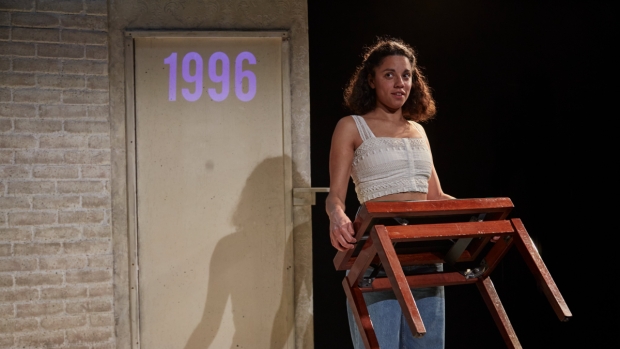”Elephant” at Bush Theatre – review

© Henri T
Anoushka Lucas takes the idea of multi-hyphenate talent to great heights. She’s a writer, singer, songwriter, composer and actress – most recently, starring as Laurie in Oklahoma!. And with Elephant, she announces herself as a playwright of considerable substance too.
The play, developed with the director Jess Edwards and two dramaturgs Daniel Bailey and Deidre O’Halloran, first appeared online as part of the Bush’s season of protest videos, commissioned in response to the murder of George Floyd. Now Lucas brings it to stage, appearing in the clearly semi-autobiographical form of Lylah, whose life is changed when her parents bring a piano into their council home when she is seven years old.
This piano doesn’t just arrive, it flies in – “swinging like some kind of pirate ship” – through the windows that have been removed in a tiny space, and from that point on, it vibrates with meaning and possibility. In songs and words, Lucas as Lylah probes its significance as she navigates the world, a multi-lingual, highly-motivated woman who is constantly being forced into a box by other people’s reluctance to accept her uniqueness and her ability for what it is.
Her father’s mum was from India, her mother’s father from Cameroon. She is on a scholarship from the French government to a posh private school where she doesn’t look like anyone else except the dinner lady. Lucas records all this in language that is perfectly chosen; she understands the meaning of words and how they can be altered. She recognises that she is not only the victim of racism, but also of class bias, describing the way that her home has only two rooms, while her richer classmates have parlours, drawing rooms and living rooms.
With songs that punctuate the action, and a time scale that slips backwards and forwards through her life, she paints a vivid picture of the complexities of her life, stuck between different worlds and different assumptions. She also conjures characters, from her sharply aspirational mother, barking instructions and affection in French, to a laid back uncle, to her seductive drummer boyfriend.
The power of the play, which is beautifully performed by Lucas and cleverly directed by Edwards, is the way it strips bare limiting assumptions. The record company executives, revealed in voice-over, who feel the Oxford-educated Lylah is not street enough, are revealed to be even more ghastly than her boyfriend’s upper-class family, who bring colonial assumptions to every word they speak.
Through it all runs the image of the piano, with its ivory keys and mahogany frame, already a legacy of empire and murder. Yet it is also a source of salvation, a friend, a means of expression that sends vibrations into other hearts and minds. That’s precisely what Lucas does with this piece; it is angry, but also funny, warm, and insightful, written and performed with feeling and piercing thought.










